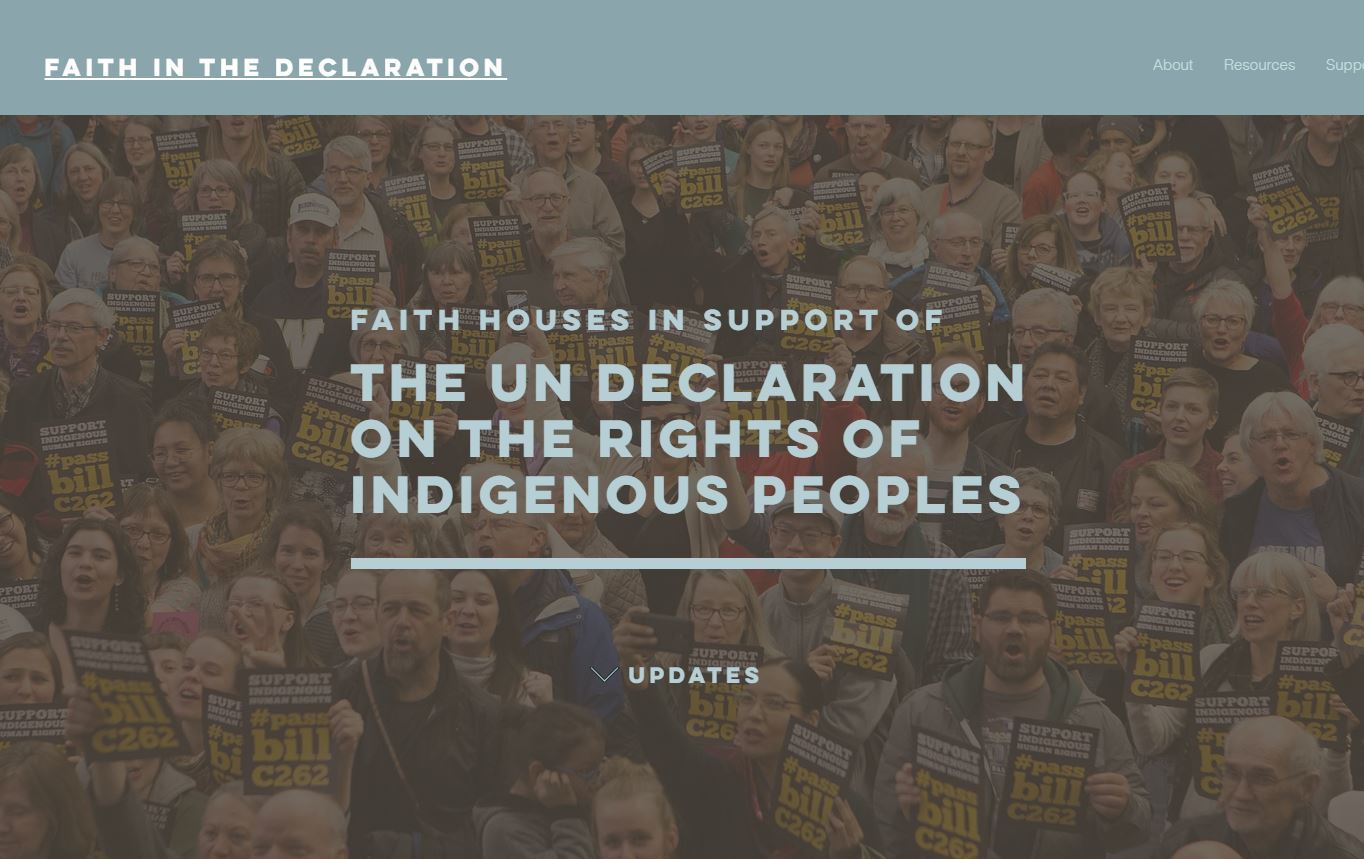

Faith in the Declaration is a ecumenical coalition supporting the implementation of Declaration legislation.
“I don't think that anybody can relax until we actually hear the words ‘royal assent.’ I think we have to be all over this,” says Jennifer Preston, general secretary for Canadian Friends Service Committee, the peace and social justice agency of Quakers in Canada.
Preston is referring to Bill C-15, “An Act respecting the United Nations Declaration on the Rights of Indigenous Peoples.” Much like its predecessor Bill C-262, which was filibustered by Conservative members of the senate[1] and died on the table in June 2020 on National Indigenous Peoples History Day, Bill C-15, if enacted, would ensure that the Government of Canada takes measures to ensure that Canadian laws are consistent with the Declaration. The government would also need to establish an action plan that outlines implementation of the Declaration’s principles.
"I don't think that anybody can relax until we actually hear the words ‘royal assent.’ I think we have to be all over this."
Unlike Bill C-262, which was a private member’s bill put forward by Cree MP Romeo Saganash in 2015, Bill C-15 is a government bill, which means the opposition does not have the same powers to delay it. However, in a webinar hosted by Faith in the Declaration on May 4, former TRC Commissioner and Senator the Hon. Murray Sinclair said the Conservatives are still trying to delay action by overwhelming the standing committee with witnesses.
“This is tolerated by the government and it shouldn’t be,” Sinclair said. “They should exercise their legislative authority to ensure that while there are fair hearings relevant to the bill, that it is processed before this session ends and an election is called.”
The bill passed in the House of Commons on May 25 and is now in its first reading in the Senate. It needs two more readings and then royal assent, the final stage of the legislative process, before passing.
CFSC, along with Mennonite Church Canada and numerous other faith organizations, is part of Faith in the Declaration, a coalition committed to supporting the implementation of the United Nations Declaration on the Rights of Indigenous Peoples. In May, the coalition submitted a brief to the senate committee reviewing Bill C-15 and a written a letter to members of parliament.
“Given the historic role of churches in the dispossession of Indigenous peoples,” says Steve Heinrichs, director of Indigenous-Settler Relations for Mennonite Church Canada, “it’s vital that faith communities support the rights articulated in the Declaration. The Truth and Reconciliation Commission has called us to this work, together with all Canadians. That’s why we wrote the Senate. Bill C-15 is about decolonizing and transforming Canadian laws so that we can bring healing to the nations.”
The TRC and UNDRIP
In the webinar the three former TRC commissioners addressed questions around Bill C-15, including what faith communities can do to show their support.
Sinclair, who was a senator during Bill C-262, was direct: “Do what you did last time, because it was very effective,” referencing peoples’ direct communication with senators via e-mails, telephone calls and the “Walk the Talk” postcard campaign.
For those who have a hard time linking the Truth and Reconciliation Commission with the Declaration, former commissioner Marie Wilson was blunt in saying that the cultural genocide exposed by survivors’ testimonies at TRC events is a case study for what happens when rights, like those outlined in the Declaration, are not upheld.
“Our report is an articulation of the kind of societal mess you can get yourself into and the havoc you can wreak when you ignore all of those things that are embedded within the heart of what the UN Declaration is trying to tell us,” she said.
The importance of faith communities
Preston worked closely with Saganash on Bill C-262. She says the coming together of many churches around the UN Declaration is something that catches the government’s attention.
“When faith communities mobilize around something like Bill C-15 we help our own communities to better understand our role in addressing dispossession and oppression of Indigenous Peoples,” she says. “I also think that we have a voice. The reality is that the government gets excited about any issue when they know large numbers of people are also excited about it, from particularly varied constituencies.”
Preston says the reason for the Quakers’ support of Bill C-15 is their tradition, much like the Mennonite Church, of being a historic peace church.
“If we're really true to the central core tenet of our faith, we have to be working actively towards achieving a space where Indigenous peoples have justice,” she says.
“If we're really true to the central core tenet of our faith, we have to be working actively towards achieving a space where Indigenous peoples have justice."
Jodi Spargur, a Vancouver pastor and community organizer around the Declaration for Canadian Baptists of Western Canada, and congregations within her faith community have been vocal around the Declaration since Bill C-262. Thirty communities participated in a study on the Wrongs to Rights magazine, published by Mennonite Church Canada, and congregations have held around ten in-person and virtual learning events on the bills.
Spargur says mobilization around C-15 taps into Baptists’ strong tradition of prophetic witness. She says the webinar on May 4 helped folks understand the importance and relative simplicity of showing support for the bill.
“They were very moved by the idea that they could right away take clear action and send this e-mail to the chair of the senate committee without huge risk,” she says.
The timeline is running short. Bill C-15 must pass by June 25, which is the last day that the Senate will meet before summer recess. Over the next month, Faith in the Declaration is urging its communities to let the Senate know that they support the Declaration and Bill C-15 by sending a letter to the Senate.
“If Declaration legislation doesn’t get through this time,” says Heinrichs, “I’m not sure when we’ll get another chance. So now’s the time to act. Together, we can make it happen!”
--
[1] See “UNDRIP bill caught up in Senate dispute amid Conservative protest ,” APTN (June 12, 2019), accessed May 2021, https://www.aptnnews.ca/national-news/undrip-bill-caught-up-in-senate-dispute-amid-conservative-protest/
-30-
Media contacts
Mennonite Church Canada
Canadian Friends Service Committee